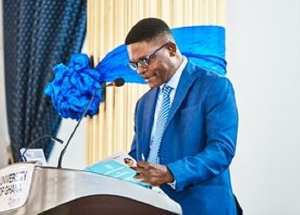The Executive Director of the Institute for Democratic Governance (IDEG), Dr Emmanuel Akwetey, has called for a change in Ghana’s hybrid system of governance, which he described as an amalgamation of democratic ideals and authoritarian remnants.
Speaking at the opening ceremony of the 75th Annual New Year School and Conference on Tuesday, January 9, 2024, at the University of Ghana. Legon, Dr Emmanuel Akwetey indicated that even though the current system has served the country well, it has, however, led the country to a point of stagnation.
According to him, violence seen during elections and the mass unemployment in the country, among others, are signs that the system has now reached a point of stagnation and needs to be replaced with what he described as a multiparty democracy.
This, he added, involves party based elections in Metropolitan, Municipal and District Assemblies (MMDAs).
He also added that failure to change the current hybrid system of governance endangers the peace and security the country enjoys because there is evidence that Ghanaians are fed up with the current system, with some clamouring for a military coup.
“The current system of governance has been good, providing us 30 years of stability, significant transformation of our economy and society and various other aspects of our nation. But it appears we have come to some point of stagnation.
“And the last decade or more we have heard about institutional reforms, we have heard about the institution of the system that should be reformed, we heard about the exclusionary nature of our politics, the violence in our elections and all that,” he said.
He further explained that, “When you put it all together, it sends the signals that if we don’t do something about the system, the peace, security and stability, we need to transform our nation in the next 30 years would not be maintained. What we have noted is that hybrid systems cannot be maintained to be resilient forever, they are created by people and they would die”.
The IDEG boss also stated that uproar against the current system of governance is even worse when it comes to the local governance system with over 75 percent of Ghanaians saying that MMDAS are dysfunctional and hence do not partake in local government elections.
Dr Emmanuel Akwetey pointed out that an effective local government is critical to taking Ghana out of this point of stagnation, and electing members of MMDAS, including Metropolitan, Municipal and District Chief Executives (MMDCES) through multiparty democracy, would help do that.
He stressed that choosing the leaders of local government through multiparty competition comes with many benefits, including the legalization of political party participation in local governance, which would not only standardize and rationalize political participation, but also address the growing disenchantment towards the existing system.
He added that for a multiparty local government system to happen, Article 55(3) of the 1992 Constitution, which bars political parties from participating in district assembly elections, and Article 243(1) which gives the president of the republic the power to appoint MMDCES, must be amended.
Dr Akwetey also pointed out that in addition to the amendment of these articles, comprehensive reforms in the legal, operational, and financial frameworks governing political parties are needed, as well as the transformation of these parties from mere electoral machines to agents of development.
These reforms, which IDEG has been championing, he said, would put “emphasis on enhancing the representation of women and marginalized groups, and devolving power to local communities”.
BAI/AE
General News of Tuesday, 23 January 2024
Source: www.ghanaweb.com













